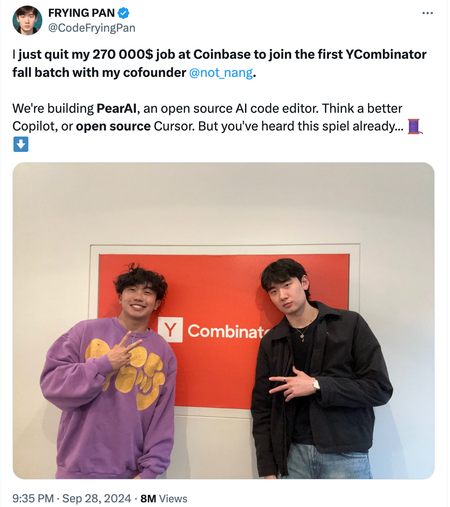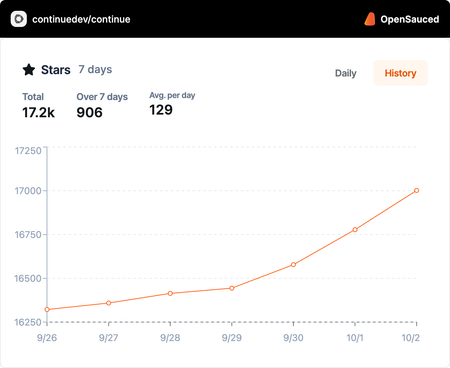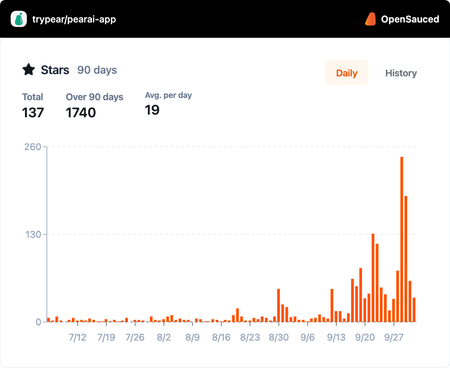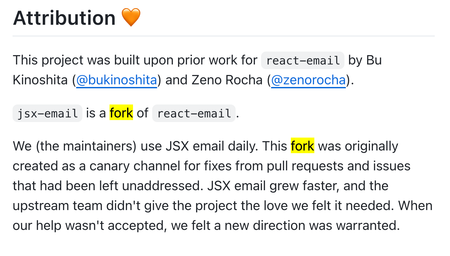
Transparency is Open Source Currency: Lessons from PearAI
BekahHW
6 mins read

On September 28, PearAI’s founder, Duke Pan (also known as “FryingPan” online), shared a tweet announcing the launch of PearAI, an AI-powered code editor which they described as a "fork of VSCode." This wasn't false, but it wasn't the full truth either, and people were quick to point this out.

It turns out that PearAI was not just a fork of VSCode; it was also a fork of Continue.dev, an AI-powered extension of VSCode. The problem? Continue.dev was licensed under the Apache 2.0 License, while PearAI was initially launched with a proprietary license called the "Pear Enterprise License."
When the community discovered that PearAI had essentially cloned Continue.dev without adding significant new features or providing proper attribution, accusations of plagiarism and license violations arose.
But did PearAI really do anything wrong? The answer is a bit more nuanced than a simple yes or no. PearAI did eventually switch back to the Apache 2.0 License and issue a public apology, but the public felt that PairAI had violated the trust and expectations of the open source community - which can have far-reaching consequences.
In open source, transparency isn’t just a virtue — it’s a requirement.
The Importance of Transparency in Open Source
Transparency is a foundational principal of open source development. It goes beyond making code publicly available; it means clear communication about a project's origins, development processes, and in interactions with contributors.
For example, jsx-email is a fork of react-email that was created to address some of the limitations of the original project. However, the maintainers of jsx-email continue to be transparent about the project's origins in their README.
The level of transparency can significantly impact the project's success and community engagement. It also mitigates the risk of misunderstandings and accusations of impropriety. Projects that lack transparency can alienate contributors and users.
Case Study: PearAI vs. Continue.dev
The PearAI and Continue.dev story shows how a lack of transparency can lead to community distrust and community backlash. PearAI’s founder, Duke Pan, admitted that PearAI was built on Continue’s code but that information wasn't easily accessible in its public-facing materials. The situation was worsened when the company introduced a proprietary license, creating the impression that PearAI was not just a fork, but an entirely new product.
After a social media storm, calling out the misleading nature of the project, Pan issued a public apology and switched back to the Apache 2.0 license.
In the long term, we'll see if PearAI can recover from this incident and rebuild trust with the open source community. At the very least, we should take this as a cautionary tale for other projects about the importance of transparency and proper attribution.
Data-Driven Insights: The Impact of Transparency on Community Engagement
The transparency issues between PearAI and Continue.dev didn’t just affect the trust within the open source community — they also increased the visibility and engagement for both projects. Looking at the data shows that the controversy caused notable spikes in stars and forks for both repositories, though the dynamics behind each project’s growth tell different stories.
Continue.dev has demonstrated strong community engagement over the past 90 days. The project has amassed a total of 17.1k stars, with over 900 stars being added in the last seven days at an average of 46 per day. The number of forks, at 1.3k total, with 490 in the last 90 days, shows a healthy growth rate of 5 forks per day. Interestingly, these numbers reflect a surge of interest likely driven by the controversy, as people went to Continue.dev either in support or to compare it with PearAI.

If you want to see a comparison, check out our Continue v. Pear Workspace
PearAI, despite the initial backlash, has also seen notable engagement, though at a much smaller scale - which is to be expected of a new project. PearAI recorded 524 stars during this period, with 1,735 stars gained in the last 90 days and an average of 19 stars per day. It also experienced an increase in forks at 79 over this time period, with 290 total forks over 90 days and 3 forks per day on average. While its numbers are smaller than Continue.dev’s, this sudden increase indicates that the announcement of the project and controversy has lead to heightened activity.

The old adage that “there’s no such thing as bad publicity” seems to hold true in this case. The controversy surrounding PearAI has inadvertently boosted its visibility and engagement, even if the attention was negative.
However, a deeper dive into the numbers reveals a more nuanced picture of community engagement. Over the last seven days:
- Continue.dev has seen ten outside contributors, with 4 recurring.
- Continue.dev has had 25 opened pull requests with six merged.
- PearAI has seen no outside contributors and only seven opened pull requests.
These metrics highlight a significant disparity in active community participation between the two projects.
Continue.dev's ability to get and retain outside contributors suggests an engaged community. PearAI's lack of outside contributors and fewer pull requests might mean challenges in converting initial interest into sustained community engagement.
While controversy can drive short-term attention, it's the foundation of trust, transparency, and community goodwill that is more likely to lead to long-term engagement and project health.
For the broader open source community, this case study serves as a reminder of the importance of:
- Maintaining transparency from the outset of a project
- Quickly addressing and rectifying any missteps in community relations
- Focusing on building a welcoming environment for contributors beyond initial marketing metrics
As we continue to watch how these projects progress, it will be interesting to see how these engagement metrics evolve and whether PearAI can bridge the gap in community participation.
The Consequences of Failing Transparency
When open source projects fail to be transparent, they risk losing the community’s trust. PearAI’s case illustrates this well. Its initial missteps led to a loss of credibility, with many contributors questioning the project’s legitimacy. The community backlash was swift, and PearAI’s subsequent efforts to rectify the situation were seen as too little, too late by some.
In open source, reputation can be everything. Projects that don’t respect the principles of open source development—particularly transparency and proper licensing—face long-term damage. Even after reverting to an open source license and offering a public apology, PearAI will likely have to work hard to regain the trust of developers and contributors.
Lessons Learned for Open Source Projects
The PearAI-Continue.dev situation offers several valuable lessons for open source projects:
-
Clear communication: From the start, open source projects need to be clear about their origins, whether they are forks, original creations, or collaborative efforts. PearAI could have avoided much of its backlash by being upfront about its relationship with Continue.dev.
-
Respect for licenses: Proper attribution isn't just a courtesy; it’s a legal and ethical requirement. By applying a proprietary license to a forked project, PearAI violated one of the key principles of open source, which contributed to the backlash.
-
Community Trust as a Competitive Advantage: Beyond just attracting contributors, transparent projects create deeper community trust, which is a long-term competitive advantage.
-
Long-term Vision: Projects should consider how their actions align with the long-term goals of building a thriving, collaborative community. Short-term gains in visibility or proprietary advantages may come at the cost of sustainable growth and community support.
Last Thoughts
Transparency isn’t just a best practice in open source — it’s the currency that keeps communities thriving. The PearAI-Continue.dev situation illustrates how quickly things can go wrong when transparency is lacking. While PearAI eventually corrected its mistakes, the damage to its reputation and community trust will take time to heal. This case serves as a reminder to all open source projects: be transparent, respect your contributors, and uphold the principles that make open source a powerful movement.

BekahHW
Bekah graduated from a coding bootcamp in May of 2019 and since then has spent time as a frontend developer, started the Virtual Coffee tech community, spent time in DevRel and has continued to mom her four kids. She currently co-hosts the Compressed.fm and Virtual Coffee podcasts, lifts heavy things in her free time, & works as the Developer Experience Lead at OpenSauced.
Recent Posts

bdougie
2 mins read
OpenSauced joins Linux Foundation, making AI-powered open source analytics freely available while expanding beyond GitHub to serve the broader open so...

#kubernetes
John McBride
5 mins read
How the OpenSauced engineering team made a near-zero downtime migration to Microsoft Azure


